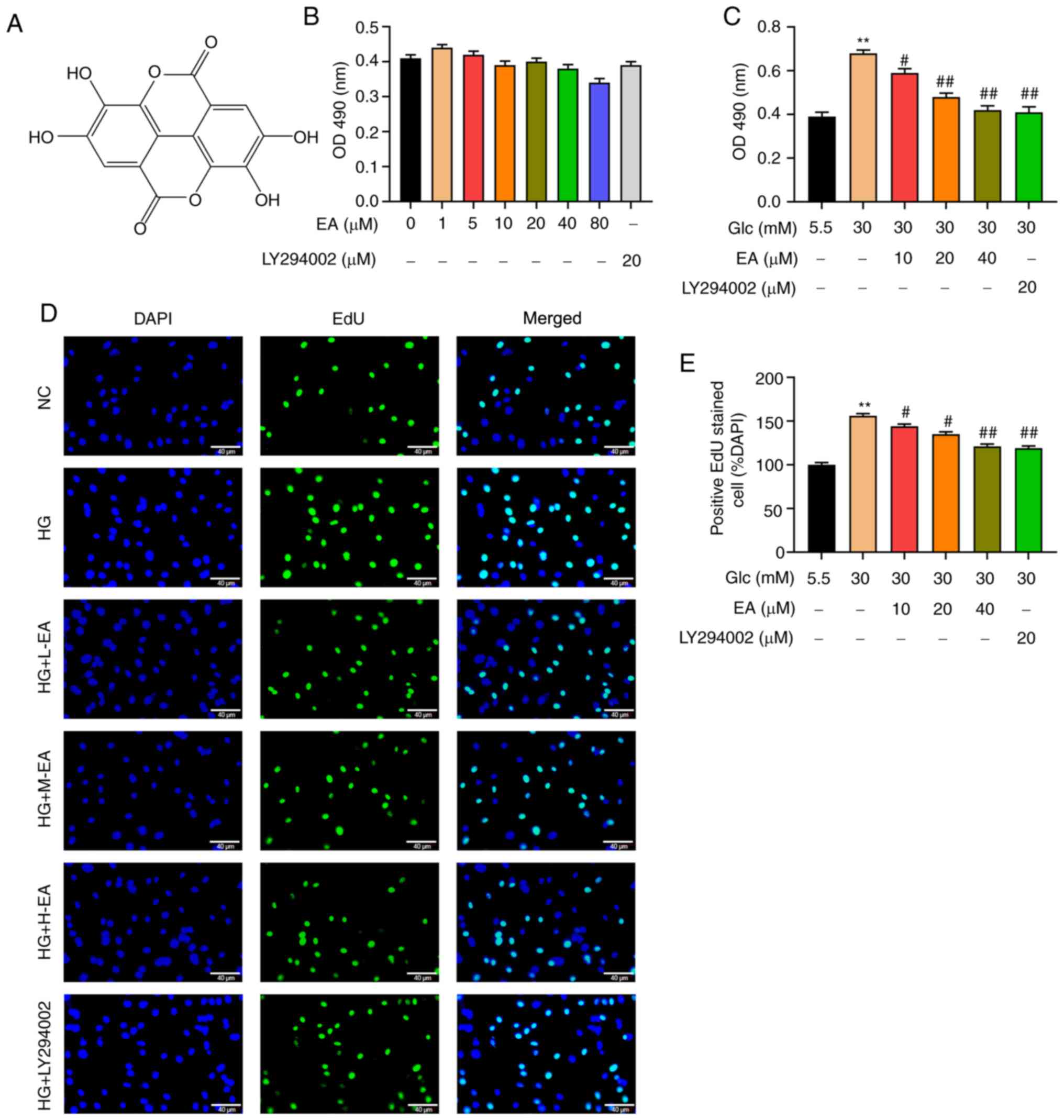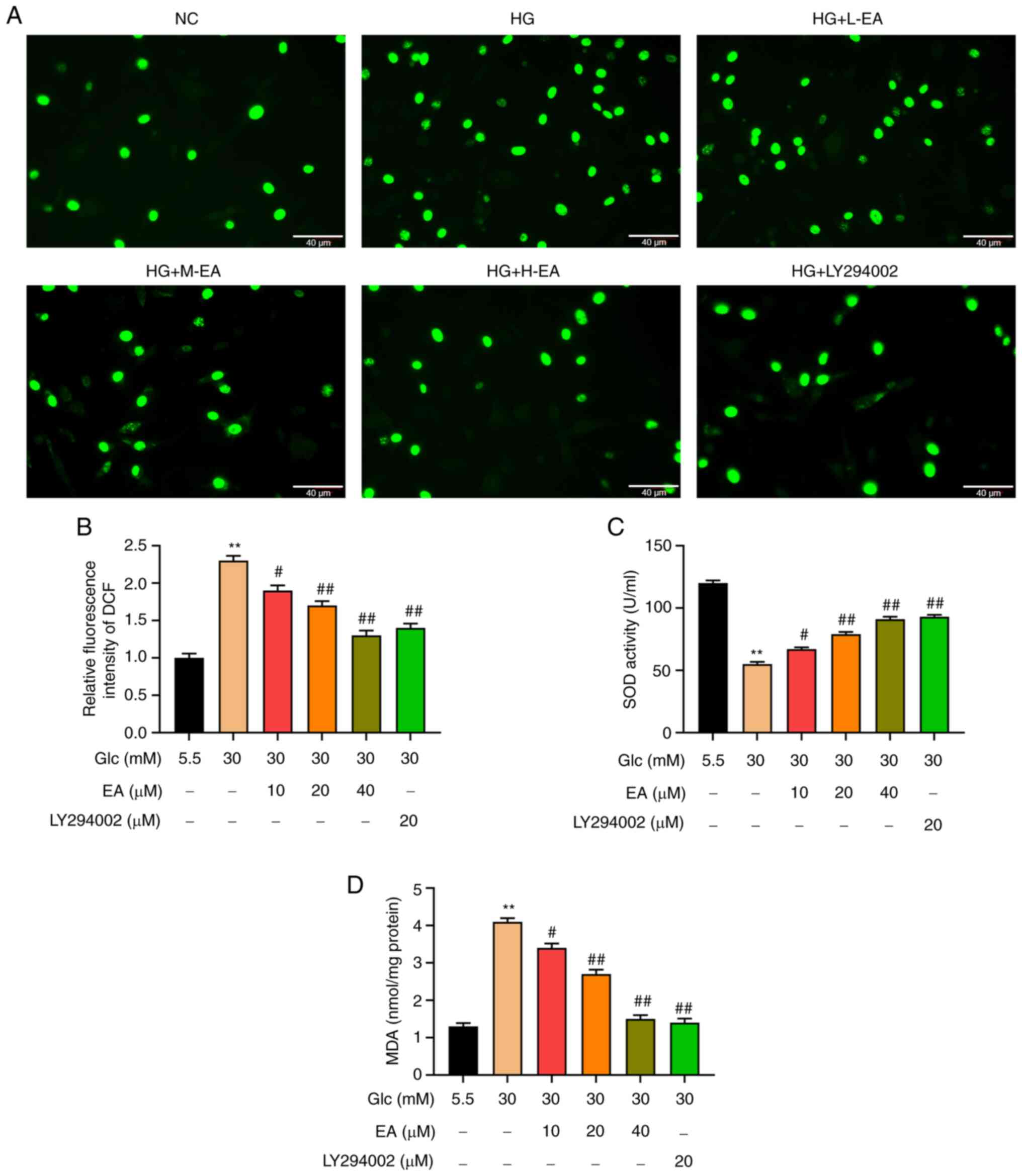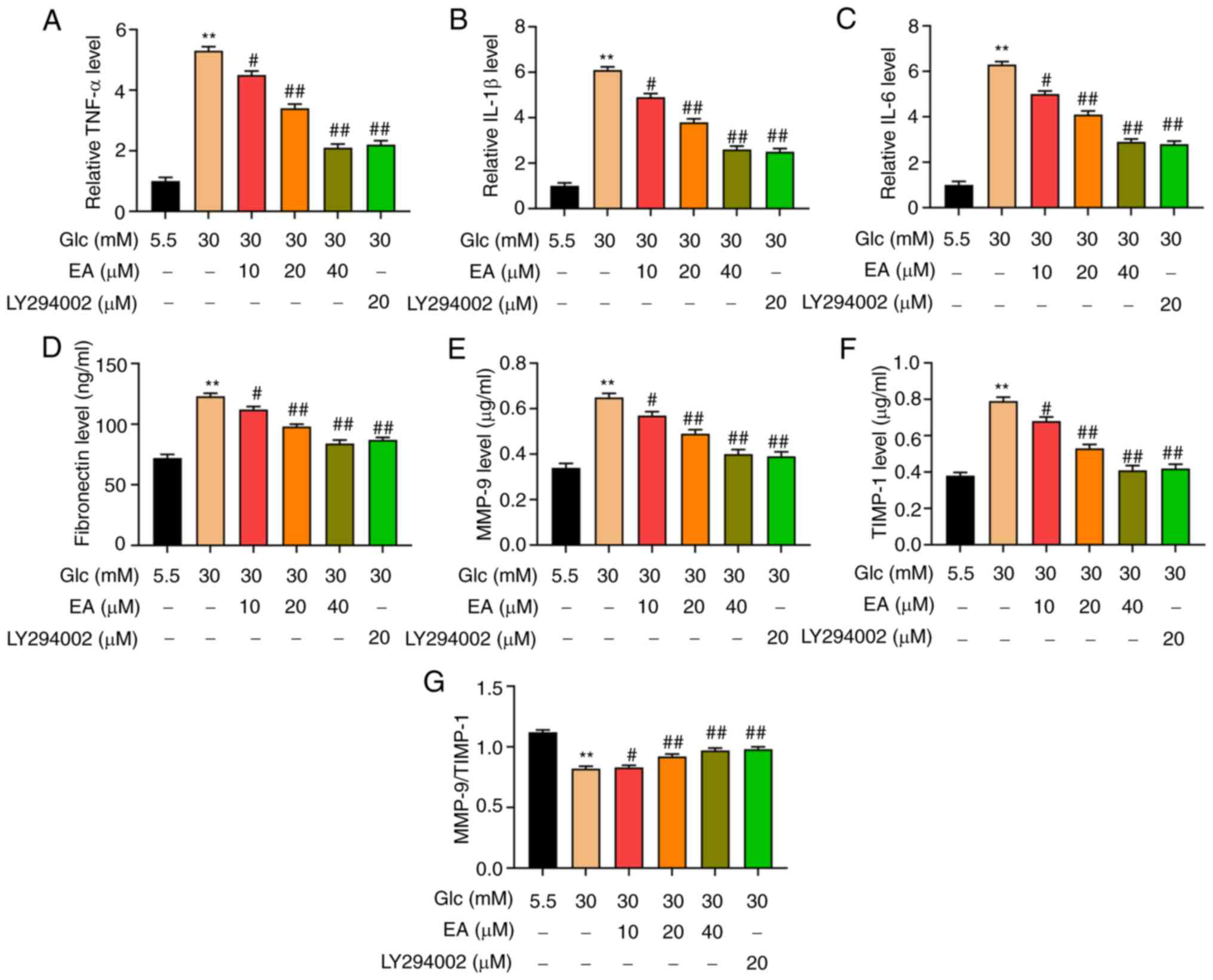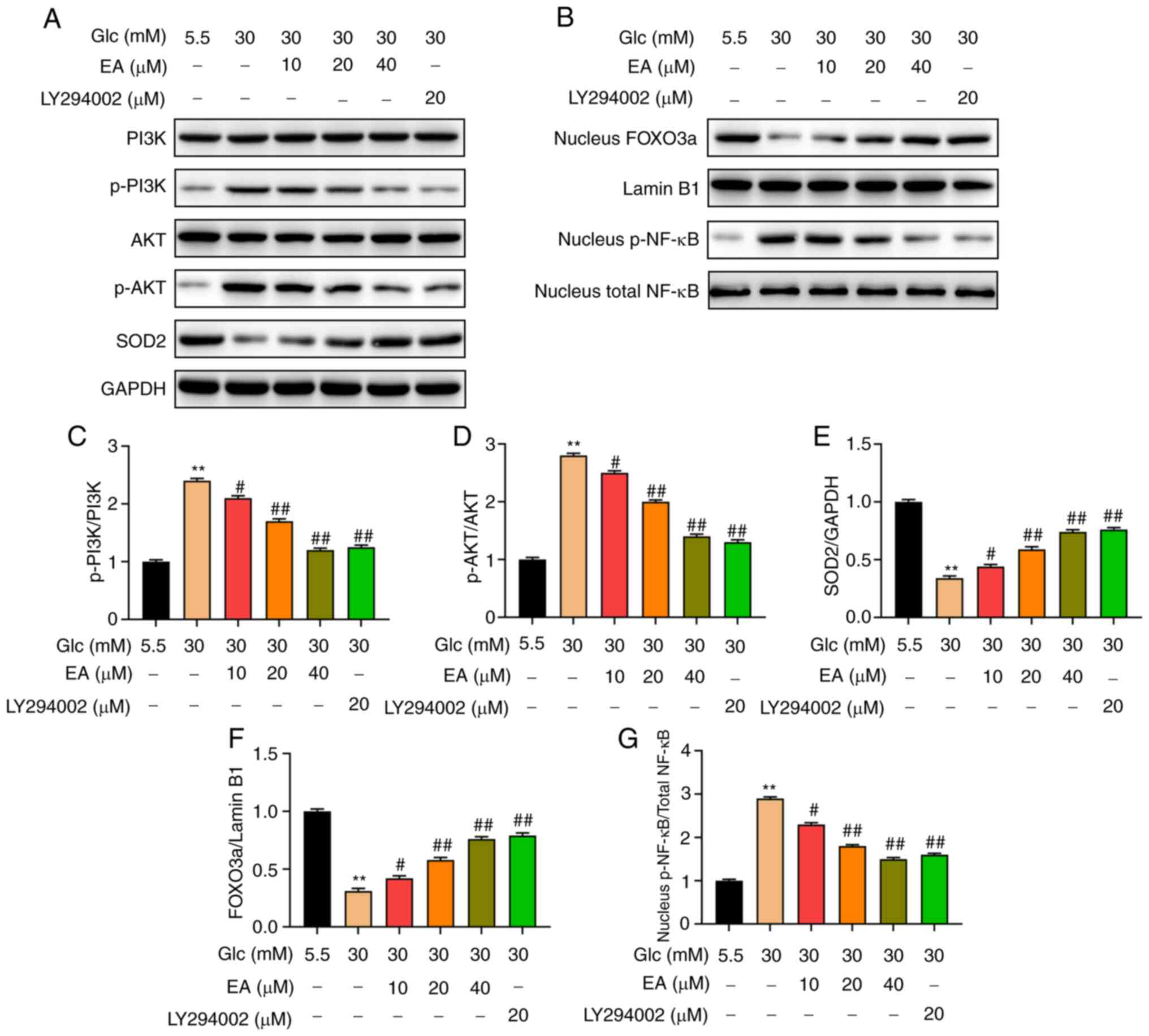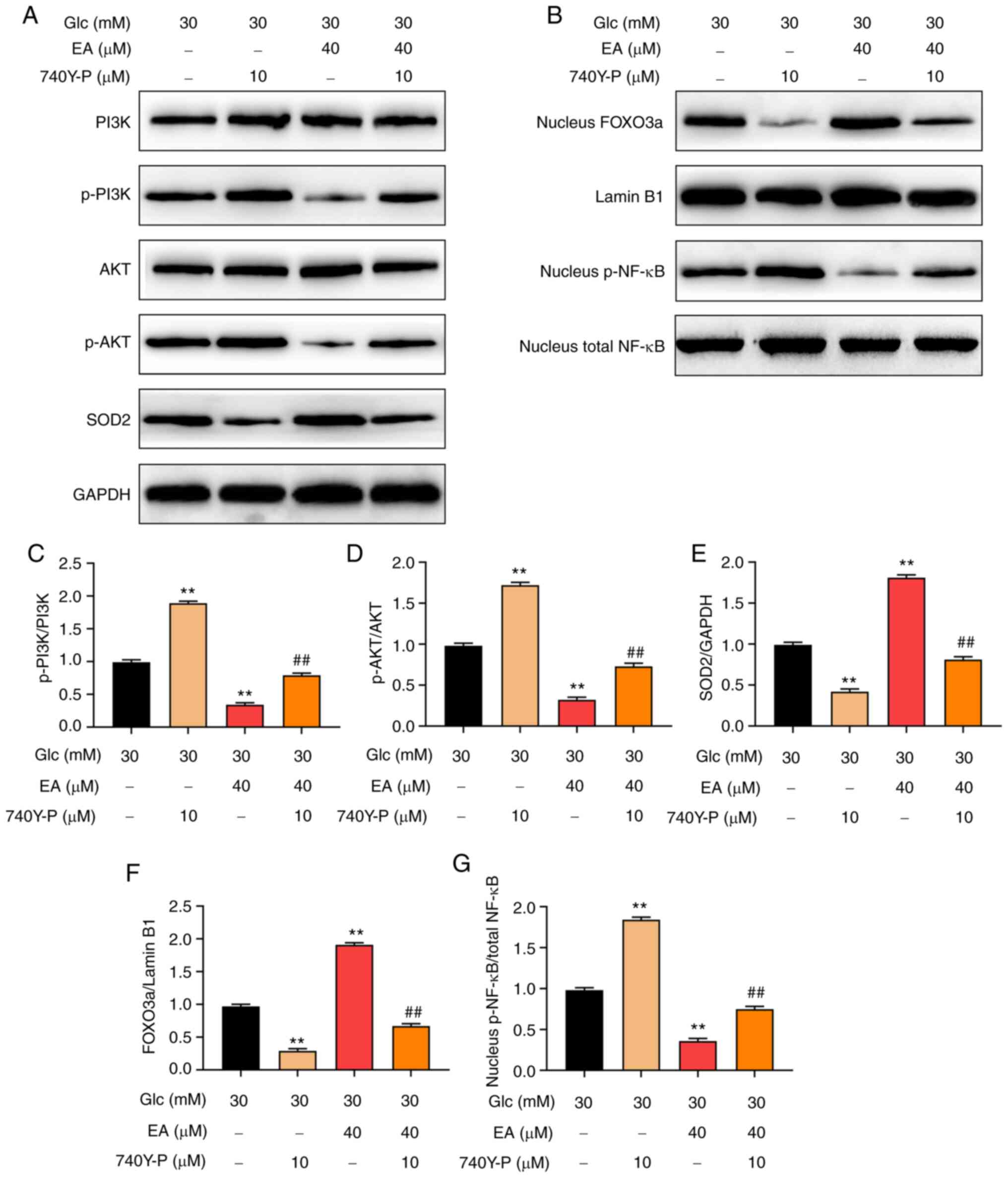|
1
|
Ilyas Z, Chaiban JT and Krikorian A: Novel
insights into the pathophysiology and clinical aspects of diabetic
nephropathy. Rev Endocr Metab Disord. 18:21–28. 2017.PubMed/NCBI View Article : Google Scholar
|
|
2
|
Qi C, Mao X, Zhang Z and Wu H:
Classification and differential diagnosis of diabetic nephropathy.
J Diabetes Res. 2017(8637138)2017.PubMed/NCBI View Article : Google Scholar
|
|
3
|
Wang G, Ouyang J, Li S, Wang H, Lian B,
Liu Z and Xie L: The analysis of risk factors for diabetic
nephropathy progression and the construction of a prognostic
database for chronic kidney diseases. J Transl Med.
17(264)2019.PubMed/NCBI View Article : Google Scholar
|
|
4
|
Furuichi K, Shimizu M, Okada H, Narita I
and Wada T: Clinico-pathological features of kidney disease in
diabetic cases. Clin Exp Nephrol. 22:1046–1051. 2018.PubMed/NCBI View Article : Google Scholar
|
|
5
|
Tung CW, Hsu YC, Shih YH, Chang PJ and Lin
CL: Glomerular mesangial cell and podocyte injuries in diabetic
nephropathy. Nephrology (Carlton). 23 (Suppl 4):32–37.
2018.PubMed/NCBI View Article : Google Scholar
|
|
6
|
Qiao S, Liu R, Lv C, Miao Y, Yue M, Tao Y,
Wei Z, Xia Y and Dai Y: Bergenin impedes the generation of
extracellular matrix in glomerular mesangial cells and ameliorates
diabetic nephropathy in mice by inhibiting oxidative stress via the
mTOR/β-TrcP/Nrf2 pathway. Free Radic Biol Med. 145:118–135.
2019.PubMed/NCBI View Article : Google Scholar
|
|
7
|
Xu K, Guo L, Bu H and Wang H: Daphnetin
inhibits high glucose-induced extracellular matrix accumulation,
oxidative stress and inflammation in human glomerular mesangial
cells. J Pharmacol Sci. 139:91–97. 2019.PubMed/NCBI View Article : Google Scholar
|
|
8
|
Jiang W, Wang R, Liu D, Zuo M, Zhao C,
Zhang T and Li W: Protective effects of kaempferitrin on advanced
glycation end products induce mesangial cell apoptosis and
oxidative stress. Int J Mol Sci. 19(19)2018.PubMed/NCBI View Article : Google Scholar
|
|
9
|
Cui FQ, Wang YF, Gao YB, Meng Y, Cai Z,
Shen C, Liu ZQ, Jiang XC and Zhao WJ: Effects of BSF on podocyte
apoptosis via regulating the ROS-mediated PI3K/AKT pathway in DN. J
Diabetes Res. 2019(9512406)2019.PubMed/NCBI View Article : Google Scholar
|
|
10
|
Manabe E, Handa O, Naito Y, Mizushima K,
Akagiri S, Adachi S, Takagi T, Kokura S, Maoka T and Yoshikawa T:
Astaxanthin protects mesangial cells from hyperglycemia-induced
oxidative signaling. J Cell Biochem. 103:1925–1937. 2008.PubMed/NCBI View Article : Google Scholar
|
|
11
|
Moon JY, Tanimoto M, Gohda T, Hagiwara S,
Yamazaki T, Ohara I, Murakoshi M, Aoki T, Ishikawa Y, Lee SH, et
al: Attenuating effect of angiotensin-(1-7) on angiotensin
II-mediated NAD(P)H oxidase activation in type 2 diabetic
nephropathy of KK-A(y)/Ta mice. Am J Physiol Renal Physiol.
300:F1271–F1282. 2011.PubMed/NCBI View Article : Google Scholar
|
|
12
|
Derosa G, Maffioli P and Sahebkar A:
Ellagic acid and its role in chronic diseases. Adv Exp Med Biol.
928:473–479. 2016.PubMed/NCBI View Article : Google Scholar
|
|
13
|
Zeb A: Ellagic acid in suppressing in vivo
and in vitro oxidative stresses. Mol Cell Biochem. 448:27–41.
2018.PubMed/NCBI View Article : Google Scholar
|
|
14
|
Ceci C, Lacal PM, Tentori L, De Martino
MG, Miano R and Graziani G: Experimental evidence of the antitumor,
antimetastatic and antiangiogenic activity of ellagic acid.
Nutrients. 10(10)2018.PubMed/NCBI View Article : Google Scholar
|
|
15
|
Ahad A, Ganai AA, Mujeeb M and Siddiqui
WA: Ellagic acid, an NF-κB inhibitor, ameliorates renal function in
experimental diabetic nephropathy. Chem Biol Interact. 219:64–75.
2014.PubMed/NCBI View Article : Google Scholar
|
|
16
|
Lee WJ, Ou HC, Hsu WC, Chou MM, Tseng JJ,
Hsu SL, Tsai KL and Sheu WH: Ellagic acid inhibits oxidized
LDL-mediated LOX-1 expression, ROS generation, and inflammation in
human endothelial cells. J Vasc Surg. 52:1290–1300. 2010.PubMed/NCBI View Article : Google Scholar
|
|
17
|
Liu B, Lin J, Bai L, Zhou Y, Lu R, Zhang
P, Chen D, Li H, Song J, Liu X, et al: Paeoniflorin inhibits
mesangial cell proliferation and inflammatory response in rats with
mesangial proliferative glomerulonephritis through PI3K/AKT/GSK-3β
pathway. Front Pharmacol. 10(978)2019.PubMed/NCBI View Article : Google Scholar
|
|
18
|
Li F, Zhang Z, Wang P, Wen P, Xu Q, Wang
Y, Pan P and Ma L: ALC1 knockdown enhances cisplatin cytotoxicity
of esophageal squamous cell carcinoma cells by inhibition of
glycolysis through PI3K/Akt pathway. Life Sci.
232(116679)2019.PubMed/NCBI View Article : Google Scholar
|
|
19
|
Zhao C, Gu Y, Chen L and Su X:
Upregulation of FoxO3a expression through PI3K/Akt pathway
attenuates the progression of lupus nephritis in MRL/lpr mice. Int
Immunopharmacol. 89 (Pt A)(107027)2020.PubMed/NCBI View Article : Google Scholar
|
|
20
|
Zhang J, Wang X, Vikash V, Ye Q, Wu D, Liu
Y and Dong W: ROS and ROS-mediated cellular signaling. Oxid Med
Cell Longev. 2016(4350965)2016.PubMed/NCBI View Article : Google Scholar
|
|
21
|
Zhao JH: Mesangial cells and renal
fibrosis. Adv Exp Med Biol. 1165:165–194. 2019.PubMed/NCBI View Article : Google Scholar
|
|
22
|
Migliorini A, Ebid R, Scherbaum CR and
Anders HJ: The danger control concept in kidney disease: Mesangial
cells. J Nephrol. 26:437–449. 2013.PubMed/NCBI View Article : Google Scholar
|
|
23
|
Cao A, Wang L, Chen X, Guo H, Chu S, Zhang
X and Peng W: Ursodeoxycholic acid ameliorated diabetic nephropathy
by attenuating hyperglycemia-mediated oxidative stress. Biol Pharm
Bull. 39:1300–1308. 2016.PubMed/NCBI View Article : Google Scholar
|
|
24
|
Dong Z, Sun Y, Wei G, Li S and Zhao Z:
Ergosterol ameliorates diabetic nephropathy by attenuating
mesangial cell proliferation and extracellular matrix deposition
via the TGF-β1/Smad2 signaling pathway. Nutrients.
11(11)2019.PubMed/NCBI View Article : Google Scholar
|
|
25
|
Das F, Maity S, Ghosh-Choudhury N,
Kasinath BS and Ghosh Choudhury G: Deacetylation of S6 kinase
promotes high glucose-induced glomerular mesangial cell hypertrophy
and matrix protein accumulation. J Biol Chem. 294:9440–9460.
2019.PubMed/NCBI View Article : Google Scholar
|
|
26
|
Lu X, Fan Q, Xu L, Li L, Yue Y, Xu Y, Su
Y, Zhang D and Wang L: Ursolic acid attenuates diabetic mesangial
cell injury through the up-regulation of autophagy via
miRNA-21/PTEN/Akt/mTOR suppression. PLoS One.
10(e0117400)2015.PubMed/NCBI View Article : Google Scholar
|
|
27
|
Tan YH, Shudo T, Yoshida T, Sugiyama Y, Si
JY, Tsukano C, Takemoto Y and Kakizuka A: Ellagic acid, extracted
from Sanguisorba officinalis, induces G1 arrest by
modulating PTEN activity in B16F10 melanoma cells. Genes Cells.
24:688–704. 2019.PubMed/NCBI View Article : Google Scholar
|
|
28
|
Peng R, Wu Q, Chen J, Ghosh R and Chen X:
Isolation of ellagic acid from pomegranate peel extract by
hydrophobic interaction chromatography using graphene oxide grafted
cotton fiber adsorbent. J Sep Sci. 41:747–755. 2018.PubMed/NCBI View Article : Google Scholar
|
|
29
|
Baradaran Rahimi V, Ghadiri M, Ramezani M
and Askari VR: Antiinflammatory and anti-cancer activities of
pomegranate and its constituent, ellagic acid: Evidence from
cellular, animal, and clinical studies. Phytother Res. 34:685–720.
2020.PubMed/NCBI View
Article : Google Scholar
|
|
30
|
Huang Q, Chai WM, Ma ZY, Deng WL, Wei QM,
Song S, Zou ZR and Peng YY: Antityrosinase mechanism of ellagic
acid in vitro and its effect on mouse melanoma cells. J Food
Biochem. 43(e12996)2019.PubMed/NCBI View Article : Google Scholar
|
|
31
|
Cove-Smith A and Hendry BM: The regulation
of mesangial cell proliferation. Nephron Exp Nephrol. 108:e74–e79.
2008.PubMed/NCBI View Article : Google Scholar
|
|
32
|
Kurogi Y: Mesangial cell proliferation
inhibitors for the treatment of proliferative glomerular disease.
Med Res Rev. 23:15–31. 2003.PubMed/NCBI View Article : Google Scholar
|
|
33
|
Wolf G: Molecular mechanisms of diabetic
mesangial cell hypertrophy: A proliferation of novel factors. J Am
Soc Nephrol. 13:2611–2613. 2002.PubMed/NCBI View Article : Google Scholar
|
|
34
|
Yousuf M, Shamsi A, Khan P, Shahbaaz M,
AlAjmi MF, Hussain A, Hassan GM, Islam A, Rizwanul Haque QM and
Hassan MI: Ellagic acid controls cell proliferation and induces
apoptosis in breast cancer cells via inhibition of cyclin-dependent
kinase 6. Int J Mol Sci. 21(21)2020.PubMed/NCBI View Article : Google Scholar
|
|
35
|
Malik A, Afaq S, Shahid M, Akhtar K and
Assiri A: Influence of ellagic acid on prostate cancer cell
proliferation: A caspase-dependent pathway. Asian Pac J Trop Med.
4:550–555. 2011.PubMed/NCBI View Article : Google Scholar
|
|
36
|
Jha JC, Banal C, Chow BS, Cooper ME and
Jandeleit-Dahm K: Diabetes and kidney disease: Role of oxidative
stress. Antioxid Redox Signal. 25:657–684. 2016.PubMed/NCBI View Article : Google Scholar
|
|
37
|
Sztanek F, Molnárné Molnár Á and Balogh Z:
The role of oxidative stress in the development of diabetic
neuropathy. Orv Hetil. 157:1939–1946. 2016.PubMed/NCBI View Article : Google Scholar : (In Hu).
|
|
38
|
Zhou B, Li Q, Wang J, Chen P and Jiang S:
Ellagic acid attenuates streptozocin induced diabetic nephropathy
via the regulation of oxidative stress and inflammatory signaling.
Food Chem Toxicol. 123:16–27. 2019.PubMed/NCBI View Article : Google Scholar
|
|
39
|
Giacco F and Brownlee M: Oxidative stress
and diabetic complications. Circ Res. 107:1058–1070.
2010.PubMed/NCBI View Article : Google Scholar
|
|
40
|
Kashihara N, Haruna Y, Kondeti VK and
Kanwar YS: Oxidative stress in diabetic nephropathy. Curr Med Chem.
17:4256–4269. 2010.PubMed/NCBI View Article : Google Scholar
|
|
41
|
Liu Q, Liang X, Liang M, Qin R, Qin F and
Wang X: Ellagic acid ameliorates renal ischemic-reperfusion injury
through NOX4/JAK/STAT signaling pathway. Inflammation. 43:298–309.
2020.PubMed/NCBI View Article : Google Scholar
|
|
42
|
Rozentsvit A, Vinokur K, Samuel S, Li Y,
Gerdes AM and Carrillo-Sepulveda MA: Ellagic acid reduces high
glucose induced vascular oxidative stress through ERK1/2/NOX4
Signaling Pathway. Cell Physiol Biochem. 44:1174–1187.
2017.PubMed/NCBI View Article : Google Scholar
|
|
43
|
Kolset SO, Reinholt FP and Jenssen T:
Diabetic nephropathy and extracellular matrix. J Histochem
Cytochem. 60:976–986. 2012.PubMed/NCBI View Article : Google Scholar
|
|
44
|
Wada J and Makino H: Inflammation and the
pathogenesis of diabetic nephropathy. Clin Sci (Lond). 124:139–152.
2013.PubMed/NCBI View Article : Google Scholar
|
|
45
|
Rysz J, Banach M, Stolarek RA, Pasnik J,
Cialkowska-Rysz A, Koktysz R, Piechota M and Baj Z: Serum matrix
metalloproteinases MMP-2 and MMP-9 and metalloproteinase tissue
inhibitors TIMP-1 and TIMP-2 in diabetic nephropathy. J Nephrol.
20:444–452. 2007.PubMed/NCBI
|
|
46
|
Hu C, Sun L, Xiao L, Han Y, Fu X, Xiong X,
Xu X, Liu Y, Yang S, Liu F, et al: Insights into the mechanisms
involved in the expression and regulation of extracellular matrix
proteins in diabetic nephropathy. Curr Med Chem. 22:2858–2870.
2015.PubMed/NCBI View Article : Google Scholar
|
|
47
|
Mansouri Z, Dianat M, Radan M and Badavi
M: Ellagic acid ameliorates lung inflammation and heart oxidative
stress in elastase-induced emphysema model in rat. Inflammation.
43:1143–1156. 2020.PubMed/NCBI View Article : Google Scholar
|
|
48
|
Zhang M and Zhang X: The role of
PI3K/AKT/FOXO signaling in psoriasis. Arch Dermatol Res. 311:83–91.
2019.PubMed/NCBI View Article : Google Scholar
|
|
49
|
Wang Y, Ren F, Li B, Song Z, Chen P and
Ouyang L: Ellagic acid exerts antitumor effects via the PI3K
signaling pathway in endometrial cancer. J Cancer. 10:3303–3314.
2019.PubMed/NCBI View Article : Google Scholar
|
|
50
|
Liu Q, Liang X, Niu C and Wang X: Ellagic
acid promotes A549 cell apoptosis via regulating the
phosphoinositide 3-kinase/protein kinase B pathway. Exp Ther Med.
16:347–352. 2018.PubMed/NCBI View Article : Google Scholar
|
|
51
|
Wang EM, Fan QL, Yue Y and Xu L: Ursolic
acid attenuates high glucose-mediated mesangial cell injury by
inhibiting the phosphatidylinositol 3-kinase/Akt/mammalian target
of rapamycin (PI3K/Akt/mTOR) signaling pathway. Med Sci Monit.
24:846–854. 2018.PubMed/NCBI View Article : Google Scholar
|
|
52
|
Kops GJ, Dansen TB, Polderman PE, Saarloos
I, Wirtz KW, Coffer PJ, Huang TT, Bos JL, Medema RH and Burgering
BM: Forkhead transcription factor FOXO3a protects quiescent cells
from oxidative stress. Nature. 419:316–321. 2002.PubMed/NCBI View Article : Google Scholar
|
|
53
|
Rangan G, Wang Y and Harris D: NF-kappaB
signalling in chronic kidney disease. Front Biosci. 14:3496–3522.
2009.PubMed/NCBI View
Article : Google Scholar
|
|
54
|
Yang L, Hu X and Mo YY: Acidosis promotes
tumorigenesis by activating AKT/NF-κB signaling. Cancer Metastasis
Rev. 38:179–188. 2019.PubMed/NCBI View Article : Google Scholar
|
|
55
|
Aslan A, Gok O, Erman O and Kuloglu T:
Ellagic acid impedes carbontetrachloride induced liver damage in
rats through suppression of NF kB, Bcl 2 and regulating Nrf 2 and
caspase pathway. Biomed Pharmacother. 105:662–669. 2018.PubMed/NCBI View Article : Google Scholar
|















